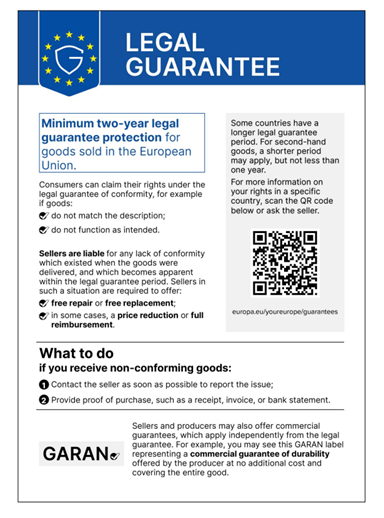Caveat Venditor and Sellers Beware: New Rules require Product Guarantee Information for All Consumer Products
The European Commission (EC) continues with its agenda on enhancing consumer rights and empowering consumers for the green transition. Most recently, in late September 2025, the EC adopted an Implementing Regulation (EU) 2025/1960 (new Regulation) that looks to provide consumers across the European Union (EU) with clear information on their legal rights when there is something wrong with a product they have purchased.
From 27 September 2026, all websites and physical shops in the EU selling goods of any type to consumers will be required to prominently display a new mandatory notice reminding consumers about their legal guarantee rights. This extends beyond categories such as electronics and appliances and applies to clothing, shoes, accessories, furnishings, décor, toys, beauty products, and more.
Consumer brands and resellers should therefore carefully review their guarantee policies in EU Member States now to ensure compliant processes and terms are in place and point of sale materials and online copy are prepared and distributed in time for the go-live date next year. This alert considers the key requirements and how they differ from the position today.
Legal Guarantee v Commercial Guarantee
Before we dive into the new Regulation and what it means for your business, it is important to ensure that different types of guarantees are understood. There are two distinct types of guarantees, namely, legal guarantees and commercial guarantees.
Legal Guarantees
Legal guarantees (also known as “statutory warranty rights”) are mandatory legal protections for consumers imposed by statute in the event a product does not conform to the mandatory requirements, including not complying with its description or if it has a defect during the legal guarantee period. These rights are enshrined in EU consumer protection law and cannot be excluded by the seller. The Sales of Goods Directive (EU) 2019/771 entitles consumers to a minimum of two years’ legal guarantee following purchase, with some Member States (including Spain and Portugal) providing for longer periods of protection. During the legal guarantee period, a consumer may require the direct seller of a nonconforming product to repair or replace it free of charge and, in some circumstances, to provide a price reduction or a refund. In some EU Member States, whilst the law initially provides for a “no questions asked” approach (i.e. a presumption that the defect/nonconformity was present on purchase), after the first 12 months the onus shifts to the consumer to prove this. Thus, in those markets a legal guarantee can become more difficult for a consumer to rely upon in practice after the first year.
Commercial Guarantees
Commercial guarantees (also sometimes referred to as “manufacturer warranties” or “durability guarantees”) are optional, enhanced rights sometimes offered by traders in their discretion. These are additional to the consumer’s rights under its legal guarantee—for instance, longer protection, broader coverage (not just covering manufacturing defects but also wear and tear or certain forms of damage by the consumer or loss), or extra entitlements (e.g. replacement during repair, drop-off at any authorised dealers, etc.). Commercial guarantees can be offered free-of-charge or for a fee. Importantly, a commercial guarantee does not exclude the consumer’s legal rights imposed by law. Additionally, a commercial guarantee must offer some further rights for the consumer that go above and beyond the mandatory legal guarantee. A reseller cannot simply restate the consumer’s legal rights, since this could mislead a consumer who may be led to believe the seller is offering something better than its competitors when it is actually standard and automatic. The Sales of Goods Directive (EU) 2019/771 states that the conditions of a commercial guarantee should be clearly set out in an accompanying statement where a manufacturer or trader offers a commercial guarantee.
There is often some confusion among shoppers and traders alike about consumers’ entitlements under these separate guarantees. Additionally, there is broad inconsistency across websites regarding how legal guarantee rights are presented and explained to consumers (if at all). The new Regulation aims to address these weaknesses, equip consumers with clearer information about their rights, and compel noncompliant sellers to avoid shirking their duties when something goes wrong.
Harmonised Notices and Labels for Guarantees
The new Regulation introduces harmonised notices and labelling for all products sold across the EU and aims at introducing a set of uniform product markings across the EU.
These include:
A Mandatory Harmonised Notice on the Legal Guarantee
As depicted below and downloadable as a pdf here, a mandatory harmonised notice on the legal guarantee clearly states what the consumers’ legal guarantee rights are and provides high-level guidance on how a consumer can make a claim under the legal guarantee for nonconforming goods. The mandatory harmonised notice will need to be prominently displayed in all retail premises, both online and offline, across the EU.

Image Source: European Union Website
An Optional Harmonised Label for Certain Free-of-Charge Commercial Guarantees if Offered by the Manufacturer or Seller
This is depicted below and available here. This label is only intended to be used where a company offers a free guarantee that lasts longer than the minimum legal guarantee period and covers the entire product. The idea behind this label is to demonstrate to consumers that the manufacturer has sufficient trust in its products’ durability to guarantee that the goods will maintain their expected functionality and performance through normal use for the number of years specified on the durability guarantee label (shown as “XX” in the draft label). The full terms of the commercial guarantee must still be set out in the brand’s commercial guarantee statement.

Image Source: European Union Website
As explained above, the commercial guarantee needs to be enhanced/in addition to the mandatory legal guarantee, and the enhancement doesn’t have to be in terms of duration necessarily.
What are the Sanctions for Getting This Wrong?
Sanctions will be covered by national legislation of each Member State. It is also important to note that consumer protection organisations will be alive to the new requirements and may initiate their own investigations.
Time to Sharpen the Pencil
- Now is the time to (re)assess any “guarantees” that your company is offering, to ensure that:
- You (or the direct resellers of your products) are respecting consumers’ legal guarantee rights;
- Any commercial guarantees being offered are clear and meet the above requirements; and
- Your physical and online points of sale and those of your partners gear up to comply with the new Regulation’s notice requirement.
This reform also presents an opportunity to showcase the trust you have in your products (and stand out from your competitors) by displaying an additional product durability label going forward.
Our team regularly advises consumer brands on their obligations under consumer protection and product compliance laws, including guarantee obligations and policies, and remains available to assist if you need any support with these.
This publication/newsletter is for informational purposes and does not contain or convey legal advice. The information herein should not be used or relied upon in regard to any particular facts or circumstances without first consulting a lawyer. Any views expressed herein are those of the author(s) and not necessarily those of the law firm's clients.









